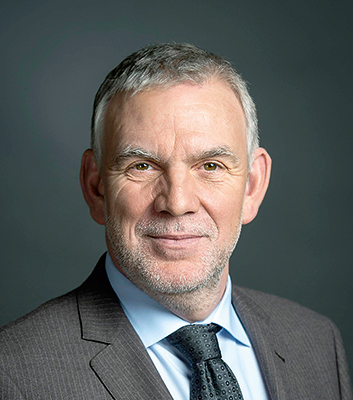A circular approach to our thoughts

The challenges, limitations and sometimes even tragic nature of environmental policy are particularly evident in connection with a number of issues. Marine litter is one of them. Intellectually, we know what we must do to keep our planet in good shape and preserve quality of life in the long run, but seemingly insurmountable obstacles appear to block progress in this direction. In my experience, most of these obstacles stem from ignorance and a lack of understanding, from people not having a sense of responsibility or having the wrong priorities.
Humankind produces more than 2,000 million tonnes of municipal solid waste each year – and this number is rising. Figures this large are beyond anything we can imagine. Yet the real issue is not even the sheer volumes involved, but their negative environmental impacts. Before polluting the environment, many thousands of tonnes have been extracted from the earth as raw materials and turned into products – often in the most deplorable social conditions and consuming a great deal of energy in the process.
Nonetheless, these items are thrown away without a second thought, sometimes after just a short period of use. This production model has major consequences, resulting in greenhouse gas emissions, destroyed water bodies and water reserves, massive energy wastage, vast resource depletion and a loss of biodiversity.
‘The waste hierarchy teaches us that it is best to prevent waste and to always prioritise recycling over landfilling.’
I intend to change current production and consumption models so that human intelligence is dedicated to protecting rather than destroying our natural resources. At the heart of this mission is a shift from linear to circular material streams. The problems involved are pernicious, as can be seen in many places. Waste is piling up in ever-higher mountains, especially in emerging economies and developing countries, because it is not returned to the economic cycle. Vast amounts of plastic litter are entering the Earth’s oceans via the world’s ten biggest rivers.
We can only tackle these issues by establishing a real circular economy. The waste hierarchy teaches us that it is best to prevent waste and to always prioritise recycling over landfilling. For this to happen, a country’s specific circumstances must be taken into account and different regional solutions must be found. Simply exporting technology is not enough. In fact, we may also need to bring the informal sector on board, supply knowledge and expertise and support the creation of the required administrative structures. GIZ has been working in this field for many years, including with support from BMU.
The international PREVENT waste alliance, which was recently publicly unveiled by BMZ and BMU, will give an even stronger boost to this approach in future. It seeks to help prevent waste and to establish recycling schemes around the globe. For instance, the German Parliament has allocated BMU EUR 50 million to combat marine littering, which we will use to support key projects. However, it is also clear that good governance on the part of recipients is critical for projects of this kind to be successful.
Not a single country in the world has already achieved an ideal circular economy. But we can share our experiences with partners wanting to move in the same direction. The waste alliance will help to demonstrate the benefits of the circular economy. BMZ and BMU are working hand in hand here to overcome seemingly insurmountable obstacles. —
published in akzente 2/19
